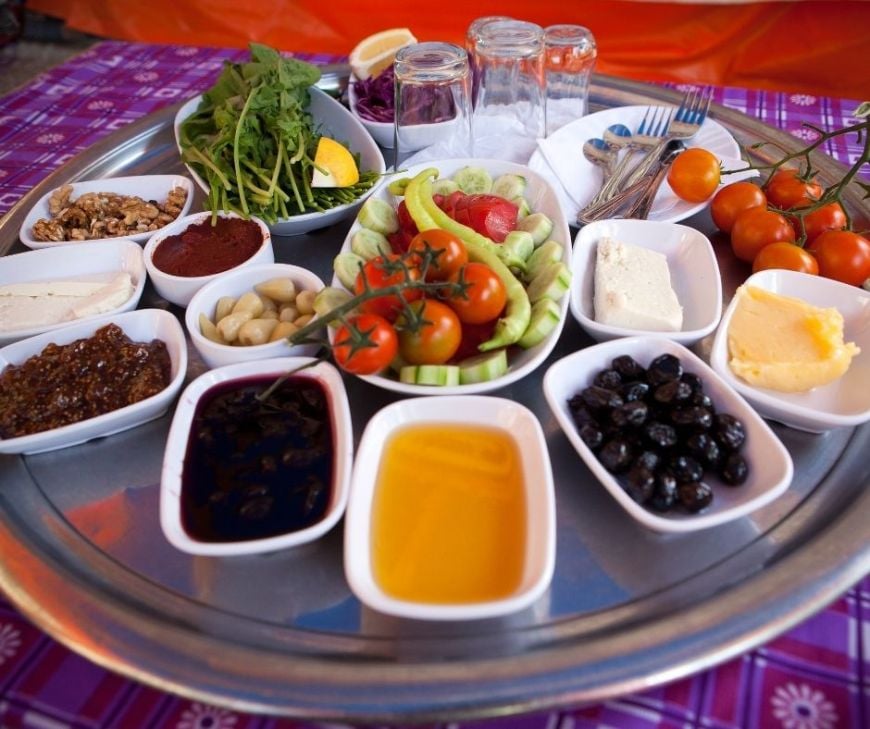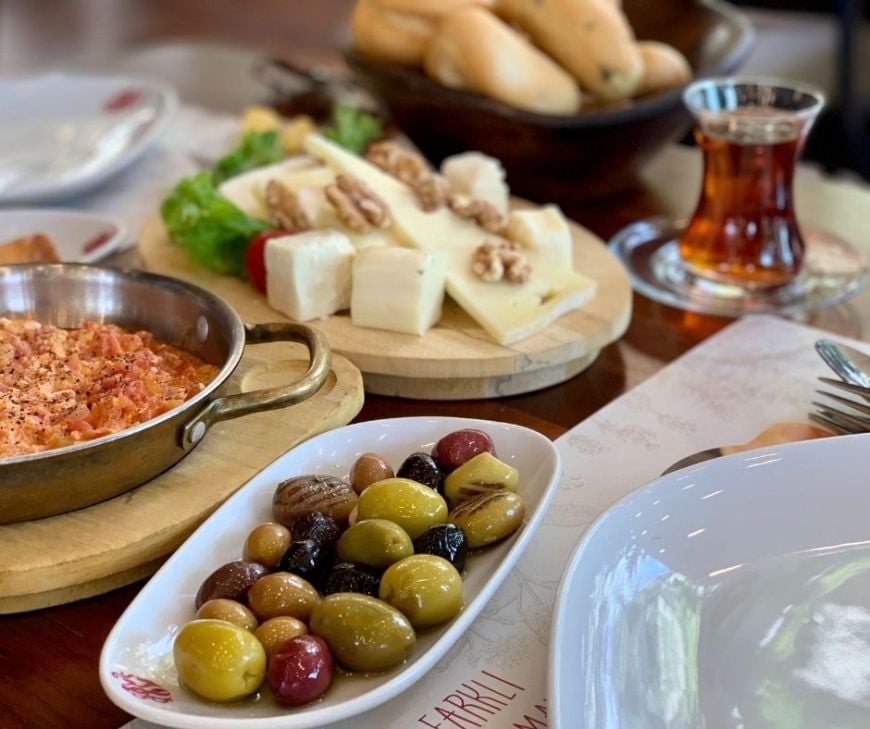When it comes to breakfast, no other meal quite captures the essence of culture and culinary artistry like a traditional Turkish breakfast. Rich in variety, vibrant in color, and bursting with flavors, a Turkish breakfast is more than just a meal.
A traditional Turkish breakfast offers a feast of diverse dishes, each contributing to a delightful and harmonious dining experience. It's not just about the food, but also about the cultural journey, bringing people together and highlighting the warmth and generosity intrinsic to Turkish culture.
The Essence of a Traditional Turkish Breakfast
A traditional Turkish breakfast, known as "kahvaltı", is a delightful feast that offers a perfect start to the day. The term "kahvaltı" literally means "before coffee," highlighting the cultural importance of this meal. Unlike many Western breakfasts that might consist of a quick bite, a traditional Turkish breakfast is meant to be savored and enjoyed at a leisurely pace, often lasting for hours, especially on weekends and holidays.

What to Expect in a Traditional Turkish Breakfast?
A typical traditional Turkish breakfast, or "kahvaltı," is a culinary delight that showcases an impressive array of dishes, each contributing to a harmonious balance of tastes and textures. This morning feast is designed not only to satisfy hunger but also to provide a rich and varied sensory experience.
The variety of dishes reflects the diversity and depth of Turkish cuisine, and each item on the table has its own unique role to play.
Here's a detailed look at what you can expect to find in a traditional Turkish breakfast:
Bread (Ekmek): The cornerstone of a traditional Turkish breakfast is freshly baked bread. Whether it's a crusty loaf, a soft simit (a sesame-encrusted bagel), or a fluffy pita, bread is an essential component used to scoop, spread, and savor the various accompaniments.
Cheese (Peynir): Cheese lovers will rejoice at the selection available in a traditional Turkish breakfast. Common varieties include beyaz peynir (white cheese similar to feta), kaşar (a semi-hard cheese), and tulum (a crumbly, aged cheese).
Olives (Zeytin): Both black and green olives are served, often marinated with olive oil, lemon, and herbs. Their briny flavor complements the richness of the other dishes in a traditional Turkish breakfast.
Tomatoes and Cucumbers: Freshly sliced tomatoes and cucumbers provide a refreshing contrast to the richer components of the traditional Turkish breakfast spread.
Honey and Preserves (Bal ve Reçel): Sweet options include honey, often served with clotted cream (kaymak), and an assortment of fruit preserves. These are perfect for spreading on bread or enjoying with cheese as part of a traditional Turkish breakfast.
Eggs (Yumurta): Eggs can be prepared in various ways, from simple boiled eggs to the popular menemen, a scrambled mixture of eggs, tomatoes, peppers, and onions, commonly found in a traditional Turkish breakfast.
Pastries (Börek): Flaky pastries filled with cheese, spinach, or meat are a common and beloved addition to the traditional Turkish breakfast table.
Sausages and Cold Cuts: Sucuk (a spicy Turkish sausage) and pastırma (cured beef) are often included for those who enjoy a bit of meat in their traditional Turkish breakfast.
Tea (Çay): No traditional Turkish breakfast is complete without a pot of strong, black tea served in small tulip-shaped glasses. Tea is the preferred beverage and is often refilled throughout the meal.
The Ritual of a Traditional Turkish Breakfast
The traditional Turkish breakfast is a deeply ingrained cultural ritual that goes beyond merely satisfying hunger. It's a time-honored tradition where families and friends come together to share stories, laugh, and enjoy each other's company. The breakfast table is set with an array of dishes, all presented at once, allowing everyone to sample a bit of everything. This communal and convivial atmosphere is a hallmark of the Turkish breakfast experience, fostering a sense of togetherness and community.
In Turkish culture, breakfast, or "kahvaltı," is considered the most important meal of the day.
Unlike the quick, grab-and-go breakfasts common in many parts of the world, a Turkish breakfast is meant to be savored and enjoyed at a leisurely pace, often lasting for hours, especially on weekends and holidays. The effort put into preparing this meal is considerable, with each dish carefully chosen and prepared to ensure a harmonious balance of flavors and textures. This dedication to breakfast reflects the Turkish values of generosity and hospitality.
The variety and abundance of dishes in a traditional Turkish breakfast also reflect the richness of Turkish cuisine. From freshly baked bread to a selection of cheeses, olives, and fresh vegetables, each component of the meal is a testament to the country's culinary heritage. Inviting someone to share in this meal is a gesture of friendship and goodwill, symbolizing a desire to strengthen bonds and share in the warmth of communal dining.

Health Benefits of a Traditional Turkish Breakfast
A traditional Turkish breakfast is renowned not only for its delicious flavors but also for its nutritional benefits. The meal typically includes a variety of fresh vegetables, such as tomatoes and cucumbers, which provide essential vitamins and minerals. Healthy fats come from olives and olive oil, which are staples in the breakfast spread. These fats are known for their heart-healthy properties, contributing to overall well-being. Whole grains from freshly baked bread add fiber and other nutrients, making the meal well-rounded and wholesome.
The inclusion of protein-rich foods like eggs and a variety of cheeses ensures that the breakfast is satisfying and helps to maintain energy levels throughout the day.
The emphasis on fresh, natural ingredients in a traditional Turkish breakfast aligns perfectly with modern health trends that prioritize whole foods and balanced diets. This approach to breakfast not only supports a healthy lifestyle but also highlights the culinary traditions of Turkey, where meals are prepared with care and a focus on quality ingredients. Whether enjoyed at home or in a café, a traditional Turkish breakfast offers a nutritious start to the day, combining taste and health in a delightful morning ritual.
Regional Variations in a Turkish Breakfast
While the essentials of a Turkish breakfast remain consistent, regional variations add unique twists to the meal, reflecting the diverse culinary traditions across Turkey. In the Aegean region, breakfasts often emphasize fresh vegetables and herbs, featuring dishes like zeytinyağlı (olive oil-based dishes) and a variety of local greens.
In Southeastern Anatolia, the breakfast spread is heartier and spicier, including specialties like katmer (a layered pastry with pistachios and clotted cream) and a rich array of cheeses and meats. In the Black Sea region, seafood elements such as hamsi (anchovies) and corn bread are common, showcasing the region's coastal influences. These regional differences enrich the traditional Turkish breakfast experience, offering a delightful exploration of Turkey's culinary diversity.
How to Create an Authentic Traditional Turkish Breakfast at Home
Creating an authentic traditional Turkish breakfast at home is a rewarding experience that allows you to explore the rich culinary traditions of Turkey. Here are some tips to get you started:
Fresh Bread: Visit a local bakery to get the freshest bread possible. If you're feeling adventurous, try making simit or pita at home.
Cheese Selection: Include a variety of cheeses such as feta, kaşar, and tulum.
Olives: Choose high-quality olives, marinated in olive oil and herbs.
Fresh Produce: Ensure you have ripe tomatoes, crisp cucumbers, and fresh herbs.
Eggs: Prepare menemen or simply boil the eggs to your preference.
Honey and Preserves: Use natural honey and a variety of fruit preserves for sweetness.
Pastries: Include store-bought or homemade börek.
Tea: Brew strong Turkish tea and serve it in traditional tulip-shaped glasses.
Set a beautiful table with small plates for each dish, creating an inviting and appetizing spread. Use colorful and decorative serving dishes to enhance the visual appeal.
Menemen: Sauté onions and peppers in olive oil until soft, then add diced tomatoes and cook until they break down into a sauce. Crack the eggs into the mixture and scramble until just set. Season with salt, pepper, and a sprinkle of Turkish red pepper flakes.
Börek: Layer thin sheets of phyllo dough with a filling of your choice (cheese, spinach, or meat), then bake until golden and crispy.

The Unmatched Delight of a Traditional Turkish Breakfast
A traditional Turkish breakfast is more than just a meal; it's a celebration of food, culture, and togetherness. The variety of dishes, the rich flavors, and the communal dining experience make it a unique and delightful way to start the day. Whether you're in Turkey or recreating this experience at home, a Turkish breakfast offers a taste of the country's warm hospitality and culinary heritage.
By embracing the delights of a traditional Turkish breakfast, you not only enjoy a delicious and satisfying meal but also partake in a cherished cultural tradition that has been perfected over centuries. So gather your loved ones, set the table, and indulge in the joy of a traditional Turkish breakfast.
As Tolerance Homes, we talked about the features of this special breed cat with admiration. It is nice to have a house in Turkey, it is even better to play games with your Angora cat in that house!
We are always ready to answer all your questions, please reach out via Whatsapp +90 (532) 158 42 44
If you want to emigrate or buy an apartment in Turkey and enjoy life by the sea, message our specialists who will find the best options for your budget.
Also, subscribe to our YouTube channel and Instagram page to receive information from the professionals!
An additional channel to connect with us: Telegram
